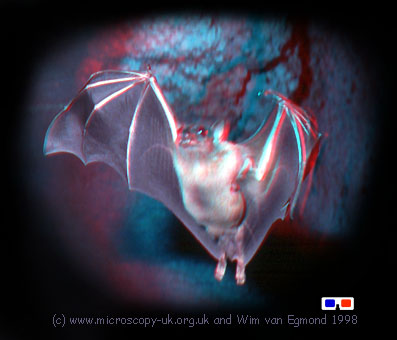

| Encounter in Scotland (Page 4) |
 |
Immediately,
we were startled by a loud sequence of clicking noises which burst from
the box in my hand and echoed, with an eerie electronic beat, from the
church walls. Van leapt towards me as something, shadowy and furtive,
fleetingly disturbed the air close to our faces. I caught an almost impossible
glimpse of a creature on the wing as it broke from its sweeping dive inches
to the side of Van: it was a bat!
 Bat
uses echo-location to detect small insects. Emits high frequency clicks
(ultra-sound pulses) above the human hearing range. Frequency: 35 Khertz
- 60 Khertz; Wavelength: 1.6mm. Bat
uses echo-location to detect small insects. Emits high frequency clicks
(ultra-sound pulses) above the human hearing range. Frequency: 35 Khertz
- 60 Khertz; Wavelength: 1.6mm. |
 The
bat-box in my hand was converting its high-frequency sound emissions
into audible clicks: sound-waves at 35,000 to 60,000 hertz were being converted
into 50 to 20,000 hertz so we could hear 'em! We could hear the sequence
growing louder or fainter as it approached or flew further away. Each time
the clicks grew louder and more urgent, we would stare into the blackness,
trying to spot the tell-tale movement. We saw the little critter several
times, caught... briefly frozen in the harsh glare of a nearby
light! The
bat-box in my hand was converting its high-frequency sound emissions
into audible clicks: sound-waves at 35,000 to 60,000 hertz were being converted
into 50 to 20,000 hertz so we could hear 'em! We could hear the sequence
growing louder or fainter as it approached or flew further away. Each time
the clicks grew louder and more urgent, we would stare into the blackness,
trying to spot the tell-tale movement. We saw the little critter several
times, caught... briefly frozen in the harsh glare of a nearby
light!
Van was very animated. It was that irrational fear which comes of not knowing a thing... and not understanding that it was not dangerous to us. Bats in this country are unable to bite humans. (Watch out for painful bites if you handle the larger ones in other countries though!). UK bats are so small... maybe the shadows and the fear of them make 'em appear much bigger than they really are! Bats in Scotland and England are very tiny: most are about 2 inches (50 mm) in body length, with wing-spans of 8 to 9 inches (200 to 230 mm). In fact, bats are the world's smallest known mammals. |
|
 |
|
| Van
was spellbound! I watched her face as fear turned to fascination and then
to curiosity... and maybe I even saw there in her eyes, an inward realization
that this tiny creature itself was lost in the dark, trying to find -
(and using everything it had) - to survive... just like her!
There in the dark shadow of that old church, with the cold Scottish night blowing across the lost and broken graves just yonder, I pulled her closer to me. Competing with the urgent wall of noise from the bat-box, I whispered: "Honey, bats hearts beat a 1000 times a minute in flight. They have to eat food equal to 25% of their body weight every day to stay alive. That's how much effort they've got to give to survive in the dark." I kissed her face gently and pressed closer to her ear, and maybe my old voice croaked a bit with emotion as I whispered soft but firmly: "That's the kinda of strong effort you've got to make for me, honey... so you survive in your dark." "If yer don't, we're both lost... cos I sure as hell can't survive without yer!" |
|
     |